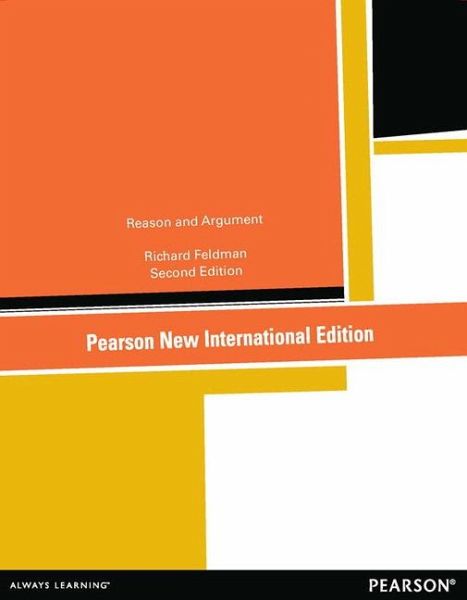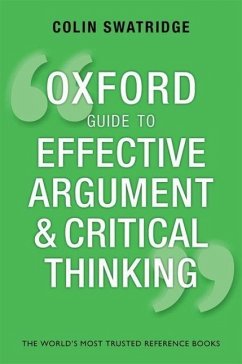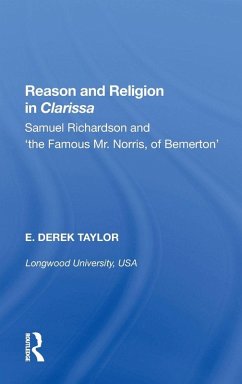
Reason and Argument
Pearson New International Edition

PAYBACK Punkte
54 °P sammeln!
This text presents a clear and philosophically sound method for identifying, interpreting, and evaluating arguments as they appear in non-technical sources. It focuses on a more functional, real-world goal of argument analysis as a tool for figuring out what is reasonable to believe rather than as an instrument of persuasion. Methods are illustrated by applying them to arguments about different topics as they appear in a variety of contexts — e.g., newspaper editorials and columns, short essays, informal reports of scientific results, etc.
Features + Benefits
NEW TO THIS EDITION
NEW - Clarifies, condenses, and simplifies the conceptual background for argument analysis. Pg.___
NEW - Provides improved discussions of:
Induction. Pg.___
Moral arguments. Pg.___
NEW - Introduces and discusses more argument patterns. Pg.___
NEW - Highlights more prominently the “Steps of Argument Analysis.”Pg.___
NEW - Features sidebars in nearly every chapter that highlight the more philosophical issues and puzzles raised or suggested in the text. Pg.___
NEW - Contains more examples and exercises. Pg.___
Focuses on a more functional, real-world goal of argument analysis:
Helps students develop the ability to see when an argument really does provide a compelling reason to believe something — to distinguish the rhetorical effectiveness of an argument from its rational merit, to tell a good argument from a bad one, and to tell what the available evidence supports. Pg.___
Provides the conceptual background necessary for understanding and evaluating arguments.
Discusses the basic concepts associated with reasons and arguments and develops and explains a relatively small set of precisely defined terms used to describe and evaluate them. Pg.___
Develops a precise, step-by-step method for analyzing arguments about a variety of topics.
Helps students easily identify the nature of the problems and errors they may be making. Pg.___
Shows how to rewrite arguments in a format that makes them clearer and makes their evaluation easier; and then how to evaluate the rewritten argument. Pg.___
Features several “Step-in Argument Analysis” charts. Pg.___
Considers arguments that have as their source someone's assertion or testimony that a statement is true; arguments about statistical and causal claims; and arguments about morality and what ought or ought not be done. Pg.___
Contains an abundance of examples throughout and encourages students to practice their reasoning skills:
Provides both serious and humorous examples — many drawn from newspapers, magazines, or books. Pg.___
Uses simple, relatively non-controversial examples to illustrate the basic ideas and concepts, and then offers more complicated and controversial examples for challenging applications. Pg.___
In a special set of exercises (at the end of each chapter) that direct students to collect and analyze material for an Argument Notebook — based on specific subject matter that they find personally interesting. Pg.___
Provides Summaries and lists. Pg.___
Key Terms at the end of each chapter. Pg.___
(NOTE: Each chapter concludes with a Summary.) I. CONCEPTUAL FOUNDATIONS.
1. Introduction.
Arguments. Reason, Rhetoric, and Argument Analysis. The Ways People Deal with Arguments. Impediments to Good Reasoning.
2. Truth and Rationality.
Uses of Language. Truth and Correspondence to the Facts. Rational Belief.
3. Well-Formed Arguments.
Argument Analysis. Well-Formed Arguments. Validity, Cogency, and the Truth Value of Premises.
4. Strong Arguments.
Deductive Strength. Inductive Strength.
II. THE METHOD OF ARGUMENT ANALYSIS.
5. Reconstructing Arguments.
Argument Reconstruction and the Principle of Charity. Distinguishing Arguments from Non-Arguments. Identifying Premises and Conclusions. General and Specific Premises. Adding Implicit Premises.
6. Details of Argument Reconstruction.
Improper Wording. Missing Premises. Including Unnecessary Premises.
7. Evaluating Arguments.
Basic Rules of Argument Evaluation. Evaluating Specific Types of Premises. Argument, Analysis and Problems of Meaning.
III. APPLICATIONS.
8. Arguments and Testimony.
The Role of Testimony. Testimonial Arguments. Premises and Testimony.
9. Statistical Arguments and Predictions.
Past to Future Arguments. Simple Statistical Statements. The Standard Pattern for Survey Arguments. Evaluating Survey Arguments. Correlations.
10. Causal Arguments.
Causal Statements. The Meaning of General Causal Statements. Knowledge of General Causal Statements. Analyzing Causal Arguments. Common Errors in Causal Reasoning.
11. Moral Arguments.
Moral Propositions. Morality, Rationality, and Truth. Analyzing Moral Arguments. Common Problems in Moral Reasoning.
12. Extended Examples.
The Abortion Debate. Mathematical Reasoning Ability.
Appendix A. The Steps of Argument Analysis.
Appendix B. Principles, Definitions, and Patterns of Argument.
Appendix C. Answers to Selected Exercises.
Glossary.
Features + Benefits
NEW TO THIS EDITION
NEW - Clarifies, condenses, and simplifies the conceptual background for argument analysis. Pg.___
NEW - Provides improved discussions of:
Induction. Pg.___
Moral arguments. Pg.___
NEW - Introduces and discusses more argument patterns. Pg.___
NEW - Highlights more prominently the “Steps of Argument Analysis.”Pg.___
NEW - Features sidebars in nearly every chapter that highlight the more philosophical issues and puzzles raised or suggested in the text. Pg.___
NEW - Contains more examples and exercises. Pg.___
Focuses on a more functional, real-world goal of argument analysis:
Helps students develop the ability to see when an argument really does provide a compelling reason to believe something — to distinguish the rhetorical effectiveness of an argument from its rational merit, to tell a good argument from a bad one, and to tell what the available evidence supports. Pg.___
Provides the conceptual background necessary for understanding and evaluating arguments.
Discusses the basic concepts associated with reasons and arguments and develops and explains a relatively small set of precisely defined terms used to describe and evaluate them. Pg.___
Develops a precise, step-by-step method for analyzing arguments about a variety of topics.
Helps students easily identify the nature of the problems and errors they may be making. Pg.___
Shows how to rewrite arguments in a format that makes them clearer and makes their evaluation easier; and then how to evaluate the rewritten argument. Pg.___
Features several “Step-in Argument Analysis” charts. Pg.___
Considers arguments that have as their source someone's assertion or testimony that a statement is true; arguments about statistical and causal claims; and arguments about morality and what ought or ought not be done. Pg.___
Contains an abundance of examples throughout and encourages students to practice their reasoning skills:
Provides both serious and humorous examples — many drawn from newspapers, magazines, or books. Pg.___
Uses simple, relatively non-controversial examples to illustrate the basic ideas and concepts, and then offers more complicated and controversial examples for challenging applications. Pg.___
In a special set of exercises (at the end of each chapter) that direct students to collect and analyze material for an Argument Notebook — based on specific subject matter that they find personally interesting. Pg.___
Provides Summaries and lists. Pg.___
Key Terms at the end of each chapter. Pg.___
(NOTE: Each chapter concludes with a Summary.) I. CONCEPTUAL FOUNDATIONS.
1. Introduction.
Arguments. Reason, Rhetoric, and Argument Analysis. The Ways People Deal with Arguments. Impediments to Good Reasoning.
2. Truth and Rationality.
Uses of Language. Truth and Correspondence to the Facts. Rational Belief.
3. Well-Formed Arguments.
Argument Analysis. Well-Formed Arguments. Validity, Cogency, and the Truth Value of Premises.
4. Strong Arguments.
Deductive Strength. Inductive Strength.
II. THE METHOD OF ARGUMENT ANALYSIS.
5. Reconstructing Arguments.
Argument Reconstruction and the Principle of Charity. Distinguishing Arguments from Non-Arguments. Identifying Premises and Conclusions. General and Specific Premises. Adding Implicit Premises.
6. Details of Argument Reconstruction.
Improper Wording. Missing Premises. Including Unnecessary Premises.
7. Evaluating Arguments.
Basic Rules of Argument Evaluation. Evaluating Specific Types of Premises. Argument, Analysis and Problems of Meaning.
III. APPLICATIONS.
8. Arguments and Testimony.
The Role of Testimony. Testimonial Arguments. Premises and Testimony.
9. Statistical Arguments and Predictions.
Past to Future Arguments. Simple Statistical Statements. The Standard Pattern for Survey Arguments. Evaluating Survey Arguments. Correlations.
10. Causal Arguments.
Causal Statements. The Meaning of General Causal Statements. Knowledge of General Causal Statements. Analyzing Causal Arguments. Common Errors in Causal Reasoning.
11. Moral Arguments.
Moral Propositions. Morality, Rationality, and Truth. Analyzing Moral Arguments. Common Problems in Moral Reasoning.
12. Extended Examples.
The Abortion Debate. Mathematical Reasoning Ability.
Appendix A. The Steps of Argument Analysis.
Appendix B. Principles, Definitions, and Patterns of Argument.
Appendix C. Answers to Selected Exercises.
Glossary.
This text presents a clear and philosophically sound method for identifying, interpreting, and evaluating arguments as they appear in non-technical sources. It focuses on a more functional, real-world goal of argument analysis as a tool for figuring out what is reasonable to believe rather than as an instrument of persuasion. Methods are illustrated by applying them to arguments about different topics as they appear in a variety of contexts e.g., newspaper editorials and columns, short essays, informal reports of scientific results, etc.
Dieser Artikel kann nur an eine deutsche Lieferadresse ausgeliefert werden.













